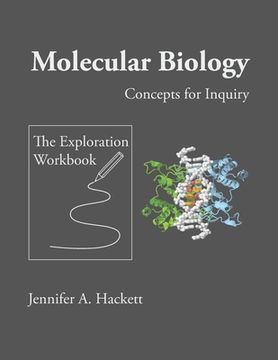Reseña del libro "Molecular Biology Concepts For Inquiry: The Exploration Workbook (en Inglés)"
Ideal for in-person or remote learning: This workbook is a companion to the introductory college-level textbook, Molecular Biology: Concepts for Inquiry. The workbook contains inquiry explorations that have been designed for use in the classroom, but could also be used for individual study. The accompanying teacher's curriculum guide, Molecular Biology Concepts for Inquiry: A Guide to Inquiry, contains a complete course curriculum, including the contents of this workbook, answers, commentary, and extensive pedagogical notes to the teacher about how to teach Molecular Biology through inquiry. This curriculum can be readily adapted for remote online learning that uses the textbook in lieu of lecture and in which the instructor guides online discussions and groupwork in the student workbook using the instructor prompts/feedback described in the guidebook. It is appropriate for college courses and high school courses taught at the college level. CLASSROOM ACTIVITIES: Students explore evidence through logic to construct an understanding of concepts and eliminate misconceptions. Students elaborate on their understanding by applying it to new situations. These activities are intended to be conducted in a classroom where an instructor periodically guides student thinking in small groups and leads class discussions of key concepts following activities. Inquiry activities include: introductory biochemistry, how proteins contribute to modes of inheritance, the structure and function of fluorescent proteins, the conceptual basis of PCR, the function of restriction enzymes and their use in engineering, the design of the mutagenesis of fluorescent proteins through Gibson assembly, analysis of an iGEM device, the design of a Golden Gate assembly of gene parts, epigenetic inheritance in imprinted diseases, analysis of the genetics of cancer (childhood vs. adult; inherited predisposition vs. sporadic), genome instability at telomeres, evaluation of next-generation DNA sequencing strategies, and the design of a CRISPR RNA to cure a genetic disease. A subset of the class activities focuses on pre- or post-experiment analyses that could either stand alone or could be used as a conceptual framework around which experiments could be conducted. Suggested experiments and other supporting materials are provided on the author's website, https: //hackettmolecularbiology.blogspot.com/. Because the paperback workbook is printed in black and white to reduce cost to the student, color images for the one activity (fluorescent proteins) that would be best in color are also provided on the author's website and the Kindle eBook includes these images in color. CLASSROOM DISCUSSION QUESTIONS: These open-ended questions serve as the basis for class discussions following Molecular Biology: Concepts for Inquiry textbook reading assignments. These readings and discussions substitute for most direct lecture in explaining concepts and they are also accompanied by online self-assessment reading comprehension quizzes. The author will distribute quiz questions to instructors for their own editing and distribution or individuals may take the author's version of quizzes. UNIT SELF-ASSESSMENTS: Students can assess their overall conceptual understanding through these assessment questions and the answers that are provided. APPENDICES AND REFERENCE MATERIALS: Self-assessment answers, guidelines for basic molecular biology laboratory techniques including PCR and restriction digests, explanations of the function of bacterial and phage promoters commonly used in engineering, list of commonly-used restriction enzymes, structures of amino acids, genetic code, periodic table, and other references. AUTHOR RECOMMENDATION: Because it is intended that students will write in this workbook, purchasing the paperback version is recommended.

